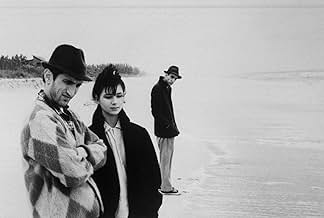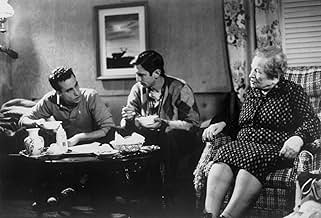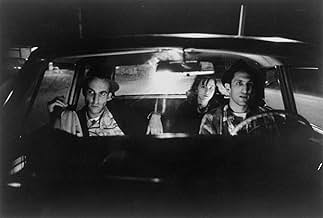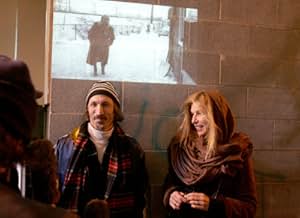IMDb-BEWERTUNG
7,4/10
42.392
IHRE BEWERTUNG
Das Leben eines New Yorkers gerät ins Wanken, als ihn seine jüngere Cousine überraschend besucht und ein seltsames, unvorhersehbares Abenteuer beginnt.Das Leben eines New Yorkers gerät ins Wanken, als ihn seine jüngere Cousine überraschend besucht und ein seltsames, unvorhersehbares Abenteuer beginnt.Das Leben eines New Yorkers gerät ins Wanken, als ihn seine jüngere Cousine überraschend besucht und ein seltsames, unvorhersehbares Abenteuer beginnt.
- Auszeichnungen
- 8 Gewinne & 2 Nominierungen insgesamt
Empfohlene Bewertungen
Odd and inspiring. This film rings true with rich detail in its depictions of utter loneliness. Smoking many Chesterfields, watching television, playing solitaire, visiting Aunt Lottie, sightseeing at Lake Erie (for God's sake). It alters from tragic to comic from almost moment to moment, and often has a foot in both pools.
Jarmusch is minimalist to the core with this one, and yet manages to pull off a solid story. A small black and white gem that deserves a larger audience.
Jarmusch is minimalist to the core with this one, and yet manages to pull off a solid story. A small black and white gem that deserves a larger audience.
Jarmusch was never much of a guy to dip in the mainstream; "Ghost Dog: Way of the Samurai" is about as Hollywood as you're going to get from him. His recent "Coffee and Cigarettes" might have alluded to his roots as an indie filmmaker, but its stories are monochromatic and offer little emotional variety save for the Albert Molina vignette. His best film might be this one, a miniature masterpiece that is underrated when compared to his other stuff. The basic premise of the film revolves around a New York immigrant from Eastern Europe, his goofy buddy, and his female cousin who comes to visit him and America as they jump from state to state.
There isn't much of a plot for sure, but Jarmusch more than compensates for this fact by creating three distinct characters that manage to be sweet without resorting to cheap sentiment. These guys might be rude and frivolous at times, but they never lose their sense of embarrassed compassion, nor as a direct result their humanity as complete characters as well. There's a morose wit to all of these proceedings. All three actors truly seem to have a playful camaraderie, working the motions of a natural friendship with Jarmusch's direction that shows them at their happiest only to be disappointed again and again, like a kid getting clothes instead of video games at Christmas once more. This honest and easygoing subtext doesn't include undemanding Hollywood moments of syrupy tenderness or mawkish emotion. For once, the clichéd adage of characters writing themselves is probably true here, as the film has an almost improvised quality to it. Jarmusch gets the careful balance between static ugliness and a subtext of natural warmth just right.
While the great heart of this film lies in its characterization, it's catapulted into greatness because of Jarmusch's quiet touch. In nearly every one of his films the director is obsessed with the awkward silences that make up nearly every relationship. He's much more revealing with the silences here, fleshing out character development in a car ride or while staring out at the blankness of snowy Cleveland. This brings me to my final point that Jarmusch again does with intelligence. When the characters move from city to city, they have a passionate belief that what they will find is something unbelievable. But the New York we see is a bunch of back alleys and graffiti. Cleveland is a blank white expanse, strangely vapid as opposed to pictorial. And Florida has to be the ugliest Florida ever depicted on screen, consisting mainly of a "Welcome to Florida" sign and a decrepit motel. While the main message is that life is often full of disappointments, that life is rarely full of transcendent moments, people can still connect with each other regardless of their surrounding environments. It's Jarmusch's best statement yet, and it's for these reasons this one must be seen even before even his fine "Mystery Train." The film, essentially a three-character comedy, is also thankfully kept brief, becoming genuinely meaningful and moving as a result.
There isn't much of a plot for sure, but Jarmusch more than compensates for this fact by creating three distinct characters that manage to be sweet without resorting to cheap sentiment. These guys might be rude and frivolous at times, but they never lose their sense of embarrassed compassion, nor as a direct result their humanity as complete characters as well. There's a morose wit to all of these proceedings. All three actors truly seem to have a playful camaraderie, working the motions of a natural friendship with Jarmusch's direction that shows them at their happiest only to be disappointed again and again, like a kid getting clothes instead of video games at Christmas once more. This honest and easygoing subtext doesn't include undemanding Hollywood moments of syrupy tenderness or mawkish emotion. For once, the clichéd adage of characters writing themselves is probably true here, as the film has an almost improvised quality to it. Jarmusch gets the careful balance between static ugliness and a subtext of natural warmth just right.
While the great heart of this film lies in its characterization, it's catapulted into greatness because of Jarmusch's quiet touch. In nearly every one of his films the director is obsessed with the awkward silences that make up nearly every relationship. He's much more revealing with the silences here, fleshing out character development in a car ride or while staring out at the blankness of snowy Cleveland. This brings me to my final point that Jarmusch again does with intelligence. When the characters move from city to city, they have a passionate belief that what they will find is something unbelievable. But the New York we see is a bunch of back alleys and graffiti. Cleveland is a blank white expanse, strangely vapid as opposed to pictorial. And Florida has to be the ugliest Florida ever depicted on screen, consisting mainly of a "Welcome to Florida" sign and a decrepit motel. While the main message is that life is often full of disappointments, that life is rarely full of transcendent moments, people can still connect with each other regardless of their surrounding environments. It's Jarmusch's best statement yet, and it's for these reasons this one must be seen even before even his fine "Mystery Train." The film, essentially a three-character comedy, is also thankfully kept brief, becoming genuinely meaningful and moving as a result.
"Stranger than Paradise" (1984): Jim Jarmusch's first film. Often listed as a "comedy" and yes, I suppose there ARE a few oddly funny moments for the most part I find it an intensely bleak film, empty of almost all life but for a few lone cruiser characters who are detached from everyone else. The photography is astoundingly beautiful black & white. They are almost shot as individual stills with minor movements in them, and divided by blatant black divisions, which one can think of as the black pages of an old photo album. The velvety rich blacks, grays, and whites, plus the composed "still" scenes, cause me to think Jarmusch was trained as a static, 2-D artist first. Just a guess. This film is NOT about acting, which is limited at best, but doesn't really need much. We observe an alienated set of scenarios which are only enhanced by the stiff, awkward exchanges and pauses of the characters, and the lack of movement in the camera work. Ambient sound adds to the gritty reality of emptiness. Funny or not, this is a low-key, lost-souls story of detachment and aimlessness.
10romper-2
I just finished watching Stranger Than Paradise on DVD - the first time I'd seen it since its year of release. I'd always recalled the film with fondness, although I could never remember why I liked it. Several years after seeing the movie I came across the John Lurie soundtrack and bought it without stopping to listen, and been slightly taken aback by it. The haunting pieces were more emotionally esoteric than I expected, and it took some time for the album to grow on me.
Seeing the movie again, I understand why. The only piece of popular music in the film is Screamin' Jay Hawkin's "I Put a Spell on You" and, although I had forgotten that it was there, I guess that I had expected the soundtrack to be more like those of mainstream movies and have songs and such-like. I think that Lurie's music is perfect in situ and, as I've said, the soundtrack has also grown on me as standalone pieces.
The movie itself is a masterpiece. The black and white images present a starkness and a clarity that heightens the alienation of self in a land that was supposed to be the new hope for immigrants from a decaying old world. Instead we see Eva walking through a deserted ghost world of New York where the graffiti says "Yankee go home". America is only a dream, a collective vision of a better world; paradise somewhere on earth.
As Willie and Eddie journey west after winning some money, we see that the supposedly beautiful city of Cleveland is cold and desolate with a frozen lake. The further trip to Florida ends in the middle of nowhere next to a bleak and windswept ocean. Paradise is still somewhere out of reach. I think that's why the movie appeals to me. It shows that the America of popular mythology - the home of the brave, land of the free, protector of the downtrodden, guardian of democracy in the free world - is merely a construct. Too many people these days believe in the child's fantasy of America being some paradise that Iraq and Afghanistan should emulate. Jarmusch reminds us that it is people who give meaning to a symbol, not the other way around. He allows for the ability of people to make their own meanings and evolve beyond the stagnation of popular culture.
At a time I originally saw this movie I had recently left home and got my first job, moving from the country to the city, and maybe to some extent I identified with Eva - moving from Budapest to America. It was also my first taste of grownup film, if I recall correctly, and confirmed me with a lifelong fascination with the cinema. I have a lot to thank Jim Jarmusch for.
Seeing the movie again, I understand why. The only piece of popular music in the film is Screamin' Jay Hawkin's "I Put a Spell on You" and, although I had forgotten that it was there, I guess that I had expected the soundtrack to be more like those of mainstream movies and have songs and such-like. I think that Lurie's music is perfect in situ and, as I've said, the soundtrack has also grown on me as standalone pieces.
The movie itself is a masterpiece. The black and white images present a starkness and a clarity that heightens the alienation of self in a land that was supposed to be the new hope for immigrants from a decaying old world. Instead we see Eva walking through a deserted ghost world of New York where the graffiti says "Yankee go home". America is only a dream, a collective vision of a better world; paradise somewhere on earth.
As Willie and Eddie journey west after winning some money, we see that the supposedly beautiful city of Cleveland is cold and desolate with a frozen lake. The further trip to Florida ends in the middle of nowhere next to a bleak and windswept ocean. Paradise is still somewhere out of reach. I think that's why the movie appeals to me. It shows that the America of popular mythology - the home of the brave, land of the free, protector of the downtrodden, guardian of democracy in the free world - is merely a construct. Too many people these days believe in the child's fantasy of America being some paradise that Iraq and Afghanistan should emulate. Jarmusch reminds us that it is people who give meaning to a symbol, not the other way around. He allows for the ability of people to make their own meanings and evolve beyond the stagnation of popular culture.
At a time I originally saw this movie I had recently left home and got my first job, moving from the country to the city, and maybe to some extent I identified with Eva - moving from Budapest to America. It was also my first taste of grownup film, if I recall correctly, and confirmed me with a lifelong fascination with the cinema. I have a lot to thank Jim Jarmusch for.
Stranger Than Paradise, which put filmmaker Jim Jarmusch on 'the map' in the small but superlative crop of independent filmmakers of the eighties (he was the first, then came the Coen Brothers, then Spike Lee, and then culminating in the 90's with the 'new wave' of independent filmmakers). What he presents here is a unique little treatise on youth, on the subtle and disconnected qualities that go in life when you don't have much to do. In a way it's an existentialist film without many very serious questions to deal with story or even character-wise (except until maybe the last fifteen minutes in the "Paradise" segment). Like a French New-Wave film, to which Jarmusch was heavily influenced by (i.e. the gorgeous, grainy black and white photography by Tom DiCillo), he leaves more for the audience to ponder, as they go along on their journey.
One of the things that Stranger Than Paradise has going for it is a sort of realism that, like and not-like a Wes Anderson film for example, is off-beat. Only here it is more of an urban sort of landscape and interiors that Jarmusch gives us with, along with its three principles. John Lurie as Willie is very good at having attitude when he needs it, but in reality is rather low-key in his 'hip-ness'. His cousin from Hungary pays him a visit (Eszter Balint as Eva, maybe too low-key at times, though appropriately observant of foreign territory). There is also his faithful companion Eddie, played in a great supporting tone and style by Richard Edson. The first segment of the film deals with her in New York. The second one has Eddie and Willie go to Cleveland to pay Eva a visit. Then in the third segment they go down to Florida to have some fun, only to have anything but.
In other words, those looking for a film where a lot of things 'happen' may be disappointed, or just bored. I've seen the film twice now, and on the first viewing I was a little detached from what was going on on screen, which is just little things going on with the characters, like one would see in everyday life. But on the second viewing I somehow connected more with these characters, the youth that seem to drift needlessly along. The editing of the film is also the most simplistic, though highly effective, in adding to the disconnected quality of Jarmusch's direction- no cuts during dialog, just fading to black, fading up, fading to black, fading up (Jarmusch would continue this with Down by Law and Dead Man, though not as frequent or strategic).
In fact, the whole film is rather deliberate in its style, but as the song that plays several times in the film "I Put a Spell On You" from Screamin' Jay Hawkins plays, it does work to bring a viewer in...or not. Like many in the "art-film" world, almost all of Jarmusch's films are either liked or not, and I think that's appropriate for his stories, which often deal with low-key characters dealing with unusual but either realistic or metaphorical situations. One thing I can say for certain, much like the French new-wave films inspired by it, it's imitated, but not equaled in its form.
One of the things that Stranger Than Paradise has going for it is a sort of realism that, like and not-like a Wes Anderson film for example, is off-beat. Only here it is more of an urban sort of landscape and interiors that Jarmusch gives us with, along with its three principles. John Lurie as Willie is very good at having attitude when he needs it, but in reality is rather low-key in his 'hip-ness'. His cousin from Hungary pays him a visit (Eszter Balint as Eva, maybe too low-key at times, though appropriately observant of foreign territory). There is also his faithful companion Eddie, played in a great supporting tone and style by Richard Edson. The first segment of the film deals with her in New York. The second one has Eddie and Willie go to Cleveland to pay Eva a visit. Then in the third segment they go down to Florida to have some fun, only to have anything but.
In other words, those looking for a film where a lot of things 'happen' may be disappointed, or just bored. I've seen the film twice now, and on the first viewing I was a little detached from what was going on on screen, which is just little things going on with the characters, like one would see in everyday life. But on the second viewing I somehow connected more with these characters, the youth that seem to drift needlessly along. The editing of the film is also the most simplistic, though highly effective, in adding to the disconnected quality of Jarmusch's direction- no cuts during dialog, just fading to black, fading up, fading to black, fading up (Jarmusch would continue this with Down by Law and Dead Man, though not as frequent or strategic).
In fact, the whole film is rather deliberate in its style, but as the song that plays several times in the film "I Put a Spell On You" from Screamin' Jay Hawkins plays, it does work to bring a viewer in...or not. Like many in the "art-film" world, almost all of Jarmusch's films are either liked or not, and I think that's appropriate for his stories, which often deal with low-key characters dealing with unusual but either realistic or metaphorical situations. One thing I can say for certain, much like the French new-wave films inspired by it, it's imitated, but not equaled in its form.
Wusstest du schon
- WissenswertesDirector Jim Jarmusch was dismayed to discover all the money he paid for the rights to Screamin' Jay Hawkins' "I Put a Spell on You" went to the record company, with nothing going to Hawkins himself. When the film earned a profit, Jarmusch took it upon himself to track down Hawkins (who was living in a trailer park, at the time) and give him some money. It was the beginning of a friendship that lasted until Hawkins' death. According to Jarmusch, Hawkins continuously swore he'd pay him back, despite Jarmusch's insistence that the money was a gift.
- PatzerWhen Eddie and Willie are driving to Cleveland, the camera and camera operator can be seen in the reflection of the rear view mirror.
- VerbindungenEdited from Stranger than Paradise (1983)
- SoundtracksI Put a Spell on You
Written by Screamin' Jay Hawkins (as Jay Hawkins)
Used by permission of CBS Unart Catalog, Inc.
All Rights Reserved.
Performed by Screamin' Jay Hawkins
Courtesy of CBS Records
Top-Auswahl
Melde dich zum Bewerten an und greife auf die Watchlist für personalisierte Empfehlungen zu.
- How long is Stranger Than Paradise?Powered by Alexa
Details
- Erscheinungsdatum
- Herkunftsländer
- Sprachen
- Auch bekannt als
- Stranger Than Paradise
- Drehorte
- Produktionsfirmen
- Weitere beteiligte Unternehmen bei IMDbPro anzeigen
Box Office
- Budget
- 90.000 $ (geschätzt)
- Bruttoertrag in den USA und Kanada
- 2.436.000 $
- Weltweiter Bruttoertrag
- 2.454.393 $
- Laufzeit
- 1 Std. 29 Min.(89 min)
- Farbe
- Seitenverhältnis
- 1.85 : 1
Zu dieser Seite beitragen
Bearbeitung vorschlagen oder fehlenden Inhalt hinzufügen

































